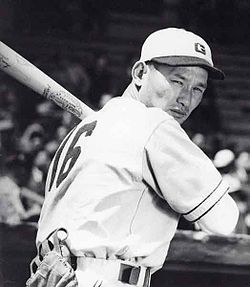

| Tetsuharu Kawakami | |
|---|---|

Tetsuharu Kawakami
| |
| First basemen | |
| Born: (1920-03-23)March 23, 1920 Hitoyoshi, Kumamoto, Japan | |
| Died: October 28, 2013(2013-10-28) (aged 93) Inagi, Tokyo, Japan | |
Batted: Left Threw: Left | |
| Japanese Baseball League (JBL) debut | |
| Spring, 1938, for the Tokyo Kyojin | |
| Last appearance | |
| 1958, for the Yomiuri Giants | |
| JBL/Nippon Professional Baseball statistics | |
| Batting average | .313 |
| Hits | 2,351 |
| Home runs | 181 |
| Runs batted in | 1,319 |
| Runs | 1,028 |
| Stolen bases | 220 |
| Teams | |
| As Player
As Manager | |
| Career highlights and awards | |
| |
| Member of the Japanese | |
| Induction | 1965 |
Tetsuharu Kawakami (川上 哲治, Kawakami Tetsuharu, March 23, 1920 – October 28, 2013) was a Japanese baseball player and manager, known for his red bat, and his nickname dageki no kamisama (打撃の神様, "the God of Batting/Hitting").
He was a professional player for 18 years, winning the batting title five times, two home run crowns, three RBI titles, and had six titles for the most hits in a season. He was the MVP of the 1953 Japan Series. He was the first player in Japanese pro baseball to achieve 2,000 hits and was named the league's MVP three times.[1] As manager of the Yomiuri Giants from 1961 to 1974, he led the Giants to eleven championships, with nine of them being in consecutive years. He has the most Japan Series championships as a manager.
Kawakami was inducted into the Japanese Baseball Hall of Fame in 1965.
Born in Hitoyoshi, Kumamoto, he played for Kumamoto Tech (Kumamoto) in the 1937 Summer Kōshien. Kumamoto advanced to the championship game, but lost. After the game, Kawakami grabbed a handful of dirt from the playing field of Kōshien Stadium and put it in his uniform pocket as a memento. This became known as the original scooping of『the dirt of Kōshien』(甲子園の土 Kōshien no tsuchi?). Since then, as a memento of their fleeting time on the hallowed grounds of Kōshien, players from the losing teams take home a pouch of the precious soil.
Kawakami played for Tokyo Kyojin/Yomiuri Giants between 1938 and 1958 (though he missed the years 1943–1945 when he served in the Japanese military). Kawakami signed with the Giants as a pitcher/first baseman, and actually pitched in 39 games between 1938 and 1941, compiling 11 wins against 9 losses, with an excellent 2.61 ERA. He converted full-time to first base in 1942.[2]
In 1951, he struck out only 6 times, which is the Japanese single-season tie record. In 1954, Kawakami hit the first cycle in Yomiuri Giants' franchise history.
As manager of the Giants from 1961 to 1974, he was known for his ruthless, tough-love style, but he led the Yomiuri Giants to nine consecutive championships.[3][4] He went 1,066–739–61 as manager while winning 44 of 62 playoff games, both of which are still the best marks in Giants history.
Kawakami was a strong advocate for keeping the league exclusively Asian only while having a strategy of "controlled baseball" with his players.[5]
Tetsuharu Kawakami appeared in three films:[6]
In addition, Kawakami is referred to by name in the baseball game scene from film director Akira Kurosawa's Stray Dog (1949); a.k.a. Nora Inu.
|
| |||||||||||||||||||||||
|---|---|---|---|---|---|---|---|---|---|---|---|---|---|---|---|---|---|---|---|---|---|---|---|
| |||||||||||||||||||||||
| The Franchise |
| ||||||||||||||||||||||
| Ballparks |
| ||||||||||||||||||||||
| Culture |
| ||||||||||||||||||||||
| Rivalries |
| ||||||||||||||||||||||
| Retired numbers |
| ||||||||||||||||||||||
| Key personnel |
| ||||||||||||||||||||||
| Japanese Baseball League championships (9) |
| ||||||||||||||||||||||
| Japan Series championships (22) |
| ||||||||||||||||||||||
| Central League championships (37) |
| ||||||||||||||||||||||
| Climax Series berths (13) |
| ||||||||||||||||||||||
| |||||||||||||||||||||||
|
| |
|---|---|
| Great Japan Tokyo Baseball Club (1934–1935) |
|
| Japanese Professional Baseball (1936–1949) |
|
| Nippon Professional Baseball (1950–present) |
|
|
| |
|---|---|
|
|
| |
|---|---|
|
| International |
|
|---|---|
| National |
|
| Academics |
|